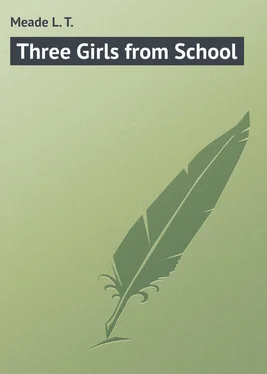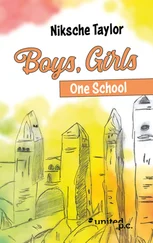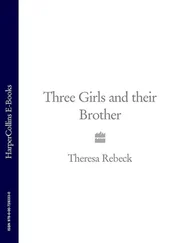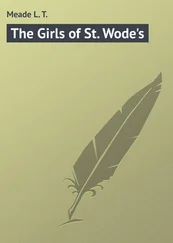L. Meade - Three Girls from School
Здесь есть возможность читать онлайн «L. Meade - Three Girls from School» — ознакомительный отрывок электронной книги совершенно бесплатно, а после прочтения отрывка купить полную версию. В некоторых случаях можно слушать аудио, скачать через торрент в формате fb2 и присутствует краткое содержание. Жанр: foreign_prose, foreign_children, на английском языке. Описание произведения, (предисловие) а так же отзывы посетителей доступны на портале библиотеки ЛибКат.
- Название:Three Girls from School
- Автор:
- Жанр:
- Год:неизвестен
- ISBN:нет данных
- Рейтинг книги:5 / 5. Голосов: 1
-
Избранное:Добавить в избранное
- Отзывы:
-
Ваша оценка:
- 100
- 1
- 2
- 3
- 4
- 5
Three Girls from School: краткое содержание, описание и аннотация
Предлагаем к чтению аннотацию, описание, краткое содержание или предисловие (зависит от того, что написал сам автор книги «Three Girls from School»). Если вы не нашли необходимую информацию о книге — напишите в комментариях, мы постараемся отыскать её.
Three Girls from School — читать онлайн ознакомительный отрывок
Ниже представлен текст книги, разбитый по страницам. Система сохранения места последней прочитанной страницы, позволяет с удобством читать онлайн бесплатно книгу «Three Girls from School», без необходимости каждый раз заново искать на чём Вы остановились. Поставьте закладку, и сможете в любой момент перейти на страницу, на которой закончили чтение.
Интервал:
Закладка:
Annie now rushed off in a tumult of happiness. It was wonderful how easily her plans were being brought to perfection. She rode into Hendon on her nice free-wheel bicycle, accompanied by two or three other girls and also by a teacher. The teacher and the girls were to leave Annie at Mrs Priestley’s, and to come again for her on their return from their own ride into the country. Annie would thus have plenty of time for her purpose.
When she was admitted into Mrs Priestley’s very fashionable waiting-room, hung round with dresses in various stages of development, and all equally fascinating according to Annie’s ideas, she felt her heart beat with satisfaction. By-and-by the mistress of the establishment made her appearance.
“I want to speak to you,” said Annie, rising. “In one moment, miss.”
Mrs Priestley would not have treated Mabel Lushington in so off-hand a manner; but Annie Brooke was not one of her customers – at least, had not been up to the present; and as she was very busy sending off a large order to Paris, she did not trouble her head about keeping the young lady waiting for nearly a quarter of an hour. During this time Annie felt very indignant. Mrs Priestley dared to sit by a large desk in her presence and to write several orders which her forewoman was dictating to her. At last the letter was finished. Mrs Priestley said, “Get this posted immediately.” Then she turned to Annie:
“What can we do for you, miss?”
“I have come to see you on a matter of some importance,” said Annie. “I have come from Miss Lushington.”
“Oh, indeed, miss? We are very sorry that we were obliged to keep you waiting, but we have a wedding order at present on hand, and it is necessary to get some special laces and flowers from Paris without any delay. What can we do for Miss Lushington, miss?”
“First of all,” said Annie, “I want to know if you will make a dress for me. I want to wear it on the prize day at Mrs Lyttelton’s school.”
“Yes, miss, we could manage; although the time is not very long. Still, we have so many of Mrs Lyttelton’s pupils on our books that we should be sorry not to oblige.” Mrs Priestley spoke as though she were royalty. “What sort of dress did you think of our making for you, miss?”
“It must not be expensive,” said Annie, whose secret thought was that she might purchase it partly out of her own money and partly out of Mabel Lushington’s very abundant pocket-money. “I think a pale-blue muslin; and can you make it for about two guineas?”
Mrs Priestley raised her eyebrows in a somewhat scornful manner.
“Quite impossible, miss. But perhaps Mrs Arnold could do it for you.”
Whenever Mrs Priestley wanted to crush a customer she alluded to Mrs Arnold, whose style was so execrable, and whose “ladies” – as Mrs Priestley spoke of them – could be known at any distance by the bad hang of their garments. Annie argued a little longer on the subject of her own dress, and finally a very simple frock was arranged for her, which would not cost the young lady much over three pounds.
Mabel’s letter was then produced.
“This is very, very private,” said Annie Brooke as she gave it to Mrs Priestley.
“Dear Miss Lushington!” murmured Mrs Priestley. “We always take such a great interest in her clothes. It is our wish to do our very utmost to mould our garments round her fine figure.”
“Read the note, please,” said Annie.
Mrs Priestley did so. If she felt surprise at the contents, her face expressed nothing.
“You will excuse us, miss,” she said when she came to the end; “we will return in a few minutes.”
She left the room. Annie sank down into a chair, feeling limp. What if Mrs Priestley were to refuse? Such a possible and awful contingency had never even occurred to her.
Mrs Priestley was away for some time, quite half-an-hour. When she did return the expression on her face had slightly changed.
“We will come into our private sitting-room, miss,” she said.
She went first; Annie followed her. Mrs Priestley’s private room was very small and very much crowded. Nearly the whole of it was taken up by an enormous desk containing various pigeon-holes. There was, however, room for two chairs. Annie was asked to seat herself in one.
“We have been looking,” said Mrs Priestley, “into our accounts. You, we understand, miss, are acquainted with the contents of the letter of our much-esteemed client, Miss Lushington.”
“Yes,” said Annie; “I know all about it. As well as I remember, my great friend, Mabel Lushington, said that I could arrange the matter with you.”
“We are coming to that – if you have no objection, miss.”
Annie felt snubbed. It so happened that she had never before had any personal contact with the great Priestley. She had seen her beautiful gowns on several ladies at Hendon and on some of the best-dressed girls of the school, but not until now had she been face to face with this awful priestess of the art of dressmaking.
“We would not wish,” said Mrs Priestley, “to do anything to disoblige our clients and it is true that there have been times when it has been our pleasure to assist a lady in the manner indicated, but there has usually been a little sort of arrangement made in order to secure our money. You, we understand, come here to-day with such a proposal, do you not, miss?”
Annie felt more and more uncomfortable.
“I simply thought,” she said, “that you would oblige. You see, Mabel is very rich.”
“If we were not firmly convinced on that point,” interrupted Mrs Priestley, “we would not entertain the proposal for a quarter of a minute.”
“Mabel is very rich,” continued Annie. “I mean that her aunt, Lady Lushington, is enormously wealthy.”
“We have that distinguished lady’s patronage,” said Mrs Priestley. “We have made gowns for her as well as for the young lady, her niece.”
“You send Miss Lushington’s accounts to Lady Lushington?” said Annie. The high priestess of the art of dressmaking thought it only necessary to bow her stately head. “Then perhaps you will lend Mabel the money?” said Annie, who felt herself getting into greater and greater hot water.
“It can be done,” said Mrs Priestley, “but only in one way. We must treat our young customer as we do the other clients whom it has been our privilege to oblige on more than one occasion. We must either have the lady’s jewels to the value of the sum borrowed, or we must add the thirty pounds to Miss Lushington’s account in our books. At the present moment Miss Lushington’s bill amounts to close on forty pounds, and if we add thirty more it will make seventy. Are we to understand that Lady Lushington will pay so large a bill without comment for a young lady who is only a schoolgirl?”
“Oh, I am sure she will,” said Annie, whose one desire at that moment was to get the money and leave Mrs Priestley’s presence. “She is so enormously rich,” continued the girl, “she thinks nothing of spending a hundred pounds on one dress for herself. Why, seventy pounds,” said Annie, who would have rejoiced just then to possess three, “is a mere nothing to her – just a bagatelle. I know it.”
“Your statement, miss, is satisfactory, as far as it goes. We will therefore, being assured by our own experience that you are right, lend Miss Lushington the required sum, but on the distinct understanding that if Lady Lushington raises any question with regard to the account, we are at liberty to mention your name in the matter.”
“How so?” asked Annie, very much alarmed. “I am only a little schoolgirl,” she added, “with no money at all.”
“Nevertheless, miss, we must mention your name – Miss Annie Brooke, is it not?”
Читать дальшеИнтервал:
Закладка:
Похожие книги на «Three Girls from School»
Представляем Вашему вниманию похожие книги на «Three Girls from School» списком для выбора. Мы отобрали схожую по названию и смыслу литературу в надежде предоставить читателям больше вариантов отыскать новые, интересные, ещё непрочитанные произведения.
Обсуждение, отзывы о книге «Three Girls from School» и просто собственные мнения читателей. Оставьте ваши комментарии, напишите, что Вы думаете о произведении, его смысле или главных героях. Укажите что конкретно понравилось, а что нет, и почему Вы так считаете.












